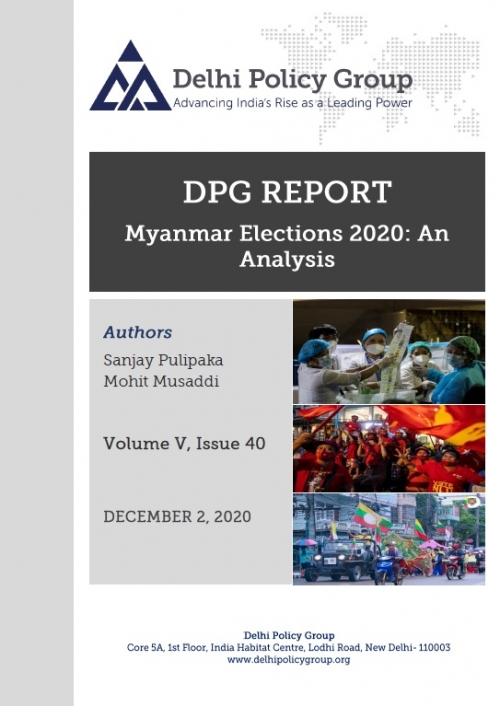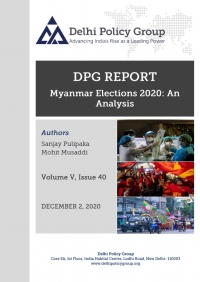Myanmar Elections 2020: An Analysis
Date: December 02, 2020
By Sanjay Pulipaka, Mohit Musaddi
Political transitions often tend to be prolonged and dotted with many uncertainties. In the recent past, India’s eastern neighbour Myanmar, with whom it shares a 1,468-km long border, has been undergoing such a transition. The country’s current constitution came into effect in 2008, and after a prolonged rule by the military junta, elections were held in 2010. The election was widely criticised for a lack of transparency, and the National League for Democracy (NLD) did not participate. The military ensured that the Union Solidarity and Development Party (USDP) won comfortably. A relatively freer election in 2015 resulted in a landslide victory of democratic forces led by the NLD. However, with a constitutional reservation of at least 25 per cent of the seats for the military, the Tatmadaw (Myanmar military) continues to have a significant role in Myanmar politics.
The recent general elections held on November 8, 2020 have further strengthened the democratic component of the Myanmar political system. The NLD won comfortably, winning 396 seats (out of 476) in the Union Parliament on the back of Daw Aung San Suu Kyi’s dominant personality and popularity. However, deep fault lines, such as ethnic conflicts across the country and sectarian violence in the Rakhine province, persist in Myanmar. The Union Election Commission (UEC) suspended voting in 22 seats and more than 1.5 million people across the country were not allowed to vote. While the election results of 2020 at a broader level demonstrate that the NLD is the most dominant political force in the country, a closer examination, particularly of the state-level results, shows that there is a diversity of political actors. Therefore, while a stable central government is a welcome outcome, particularly from a regional security perspective, bridging the ethnic divide will also remain of vital importance.
%u200B
This DPG Report provides a comprehensive assessment of the 2020 Myanmar elections and analyses the issues outlined above. The authors have delved deep into the electoral outcomes of the state Hluttaw (legislature), examined international responses and presented major takeaways in conclusion.
The recent general elections held on November 8, 2020 have further strengthened the democratic component of the Myanmar political system. The NLD won comfortably, winning 396 seats (out of 476) in the Union Parliament on the back of Daw Aung San Suu Kyi’s dominant personality and popularity. However, deep fault lines, such as ethnic conflicts across the country and sectarian violence in the Rakhine province, persist in Myanmar. The Union Election Commission (UEC) suspended voting in 22 seats and more than 1.5 million people across the country were not allowed to vote. While the election results of 2020 at a broader level demonstrate that the NLD is the most dominant political force in the country, a closer examination, particularly of the state-level results, shows that there is a diversity of political actors. Therefore, while a stable central government is a welcome outcome, particularly from a regional security perspective, bridging the ethnic divide will also remain of vital importance.
%u200B
This DPG Report provides a comprehensive assessment of the 2020 Myanmar elections and analyses the issues outlined above. The authors have delved deep into the electoral outcomes of the state Hluttaw (legislature), examined international responses and presented major takeaways in conclusion.



